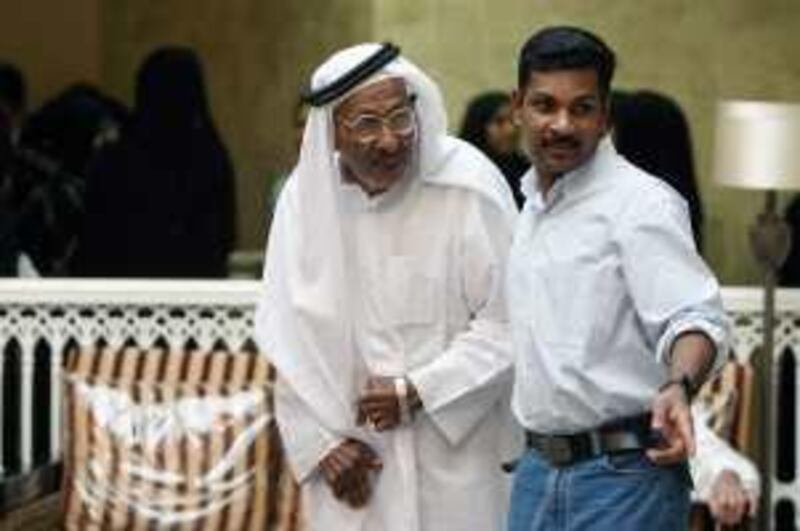Sharjah // Amina Mohammed Ali cannot remember how long she has been living in the Old People's Home of Sharjah. She is aware, though, that no one from her family has visited her for years. "They have forgotten about me," says Ms Ali. Ms Ali, who has never married, is in her late 60s. She was brought to the home by relatives after her parents died. Her right arm and part of her right leg are paralysed from a stroke about 15 years ago.
In the home, she is surrounded by hundreds of bottles of perfumes and incense, books and DVDs of her favourite Arabic television shows that she buys using a monthly stipend from the government of about Dh4,000 (US$1,100). "This is my home now. I am OK. I like my room, I decorated it in the style I like," she says, pointing to the red curtains with golden trims. When she needs inspiration, there is a poster of Mecca across her bed to gaze at.
"I am saving to do Haj one day, I just don't know how as I have no one to take me. But I don't want to give up my dream, as that is the last thing I have in the world." Ms Ali is one of 32 people over 60 living in the Sharjah home - 17 women and 15 men. She is one of the few to have her own room. The 23-year-old home is well-kept and has a physiotherapy room, a dining hall, a majless for each gender and massive gardens where the residents have picnics and walks.
Sheikha Rashid, in her late 70s, lives in a shared room across from Ms Ali. They are best friends. "We like to meet in the majlis or in Ms Ali's room and chat over coffee and sweets we get from organisations or schools," says Mrs Rashid. In her room, where each woman's living space is separated by a velvet red curtain for privacy, Mrs Rashid has a bed, a television set, a radio, a night table packed with medicine and family photos. She shares with another elderly woman, who is bedridden, and has lost her ability to speak.
"I am lucky, I have family visiting me from time to time," says Mrs Rashid. "I am not well, and so they had to put me here so I have medical attention present at all time." Mrs Rashid is confined to a wheelchair. She and Ms Ali feel lucky to have each other, as many of the people staying at the home are struggling with serious ailments such as Alzheimer's disease and paralysis. "Most of the women here can't talk any more and don't recognise who anyone is or even who they are themselves," Ms Ali says.
Some of the families hire extra help to take care of their loved ones, including an 85-year-old woman who needs constant supervision and frequent help with breathing. "I see the family come and try to talk to her, but she doesn't respond to them and they get sad," said Ann Poblete, a nurse who sleeps in a bed next to the patient. Abdullah Mubarak, 65, suffers from severe arthritis and can barely move his fingers and other joints.
He needs assistance to eat, about which he feels embarrassed. "I miss being home, I feel lonely here," he says. "We are proud people. I have endured many hardships, so it was hard to accept help." He sometimes goes home to stay with his family, who bring him back for physiotherapy. Sixty-year-old Rashid Saeed al Sori, however, never goes home. He looks forward to special occasions, when he gets to meet new people.
"I like it when there are organised events and the place is buzzing with people," says Mr al Sori. "It is usually so quiet here." Last week, on International Day for the Elderly, which lasts for five days in the UAE, Mr al Sori was visited by relatives from Oman. As his grandchildren hugged and kissed him, Mr al Sori, who is struggling with deteriorating eyesight and memory loss, could not remember who they were.
"I think I know them, but I can't remember their names," he says. "I think my mind is going and I can't do anything about it." The management organises weekly visits to malls, parks, lectures and to the beach, which remains one of the residents' favourite trips. "They love to dip their feet in the sea," says Mariam al Qatari, 31, the director of the home. "We are trying to make this as close to a home as possible and less of a hospital. We noticed that when they come here, they age faster and lose interest in life. So we keep them active and take them out and encourage them to meet the visitors and volunteers that come here."
Ms al Qatari says there is a growing interest from volunteers. University students will often drop by to read for the residents. "There is more awareness about the importance of reaching out to the elderly, an issue that before was not discussed," she says. "You just have to be extra patient and understanding around them." There are homes in all the emirates, except Abu Dhabi, where they are part of government hospitals.
But there are strict conditions and rules. Only those without families or needing constant supervision, or whose families cannot afford to take care of them, are taken in. "We don't want people to just dump their parents when they become difficult to take care of," she said. "People need patience." Despite all the facilities and attention the residents have, Ms al Qatari urges people not to belittle the value of a caring family home.





